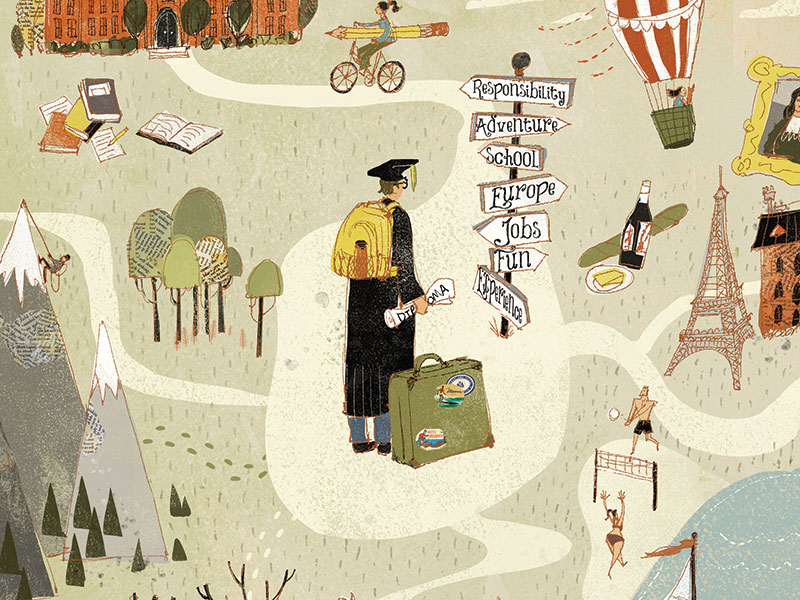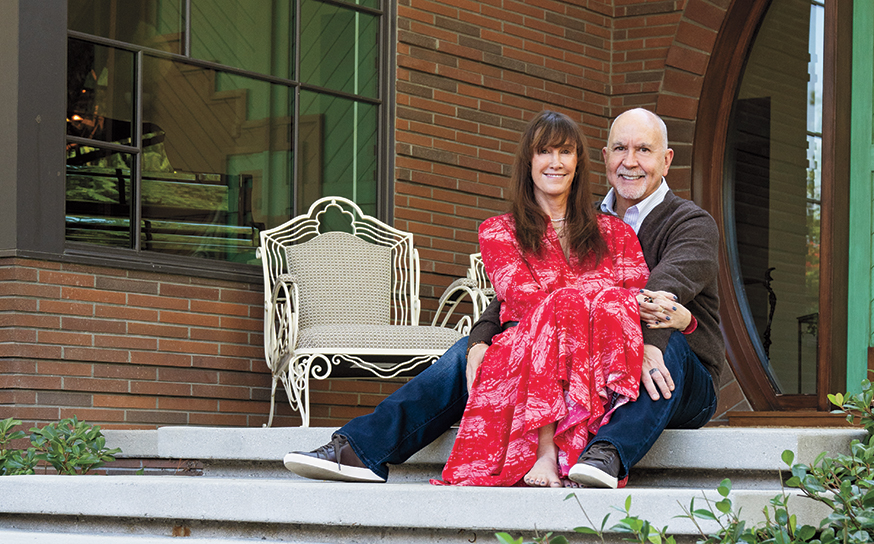
Playing and Winning the College Admissions Game
As any parent who has recently been through it knows, getting a child into a good college is a lot more complicated than it used to be. Here we offer an inside guide to navigating the sometimes complicated and often stressful college admissions process.
-
CategoryPeople
-
Written byJudith A. Stock

 Sybelle Sprague is all too familiar with the stress of getting kids into college. She and her husband, Tom, have two sons currently attending Emory University. The Encino couple is currently prepping their daughter, Bella, a junior at Viewpoint School, to embark on the admissions process next year. With experience under her belt and what one could easily view as a track record of success, you might think the stay-home mom would feel confident—almost laid-back—about going through it a third time. But reflecting on her older kids’ experiences, Sybelle says that is not the case.
Sybelle Sprague is all too familiar with the stress of getting kids into college. She and her husband, Tom, have two sons currently attending Emory University. The Encino couple is currently prepping their daughter, Bella, a junior at Viewpoint School, to embark on the admissions process next year. With experience under her belt and what one could easily view as a track record of success, you might think the stay-home mom would feel confident—almost laid-back—about going through it a third time. But reflecting on her older kids’ experiences, Sybelle says that is not the case.
“While at Viewpoint, one of the Valley’s most academic schools, the boys still had to get good grades, good test scores and juggle the challenges of an intensified athletic schedule with rigorous academics,” she says. “Both of my boys were recruited for their baseball abilities, but one minute a coach wants you; the next he’s chosen someone else.”
The Spragues’ younger son initially had his sights set on going to Columbia. The university courted Thomas until team recruiters discovered a player they perceived as better.
“Many prospective students—athletes or not—have their hearts set on a university only to be disappointed when they’re not admitted,” says Sybelle. “The recruitment process can be tough.”
THE GAME PLAN
According to Milly Roseman, co-founder of Growing Minds Academic Achievement Centers in West Hills, one thing the Spragues are doing right is thinking about Bella’s college plan well in advance.
“Preparation for college begins in high school. Start early thinking about college admissions once the parents and student decide that college is the right path,”
says Milly.
Specifically, she says parents need to think about what classes their student needs to take, how to build their portfolio, what sports and extracurricular activities to participate in, and how to ensure their child is developing the right skills to be successful at college.
“Not everybody is set up to do all AP class-es,” says Milly. “For me, the whole plan has to be with real goals. Our firm helps to identify students’ skills and refine the process.”
THE HOLISTIC STUDENT
With grade inflation, the high number of applicants and the supersized resumes of today’s overachieving and often privately tutored teens, getting into a well-known college can be a challenge. Aside from standardized test scores, academic achievements, recommendations and GPAs, many parents wonder how to get their child to stand out in such a crowded, accomplished field.
Milly advises students to strive to be “an outstanding applicant from a holistic point of view.” Paula Friedman, a college and career advisor at The Academic Match, in Westlake Village, agrees.
“A candidate should have strong test scores, excellent teacher recommendations and excel in at least one extracurricular activity, such as athletics, music, performing arts, fine arts, student government, debate, mock trial, Eagle Scouts/Girl Scouts or employment throughout the student’s high school career,” advises Paula.
Everyone we spoke to echoed this opinion. College admissions officers today tend to look at more than numbers—digging deeper for clues to what kind of person the applicant really is.
“Colleges are curious about what makes a particular applicant an interesting human being capable of affecting change in the world,” says Jennifer Simpson, director of college counseling at Campbell Hall. “Filling out applications is but one piece of a larger process of demonstrating how interested and interesting students are and their potential to positively impact a college community.”
THE NUMBERS GAME
If, upon reflecting on your own college experience, it seems harder to get into colleges these days, indeed it is. “More students are applying to more colleges, so the number of applications is increasing, while the number of spots are staying the same,” explains Paula.
She says this results in the admit rate decline, particularly for “hot” colleges like those ranked in the top 25 to 50 by U.S. News & World Report. She says the average number of colleges that her students typically apply to is 13 to 15. “Five years ago, the average number of colleges was typically 10 and sometimes fewer,” she notes.
Jennifer believes, in the application process, it is important for a student to define what their priorities are and demonstrate their ability to handle academic and personal demands, as well as a willingness to engage with learning and the world. She suggests sharing a set of interests and experiences that show a school that the student really wants to make a difference in the world.
As she points out, “Universities and colleges look for students who treat education as a privilege and not a right, and those students who take advantage of opportunities as well as creating their own opportunities.”
THE REALITY CHECK
Prepping kids and parents for the college admissions process, Campbell Hall counselors try to present a reality check freshman year. “We probe kids to think about who they are, what they envision for themselves and how that is connected to the choices they make today,” explains Jennifer.
Milly also believes in the concept of a reality check. “I am brutally honest,” she insists. “There are those students who both underestimate and overestimate themselves. I look at their transcripts, community service, etc., and sometimes there is a child that will do something like underestimate an award.”
The Spragues are taking a reality check now with Bella. “I’m confident she’ll get into a good school as she tests well and makes A’s, but I think it’s important to be reasonable with expectations,” Sybelle says.
Her husband, Tom, agrees. “Everything is relative. Our daughter has good grades, but a lot of kids have good grades. It is so competitive now for every kid. No one has it easy.”
The Spragues’ plan is to review Bella’s GPA and ACT scores next fall and apply to the target schools where she has a reasonable chance of gaining admission, along with a safety school. Sybelle believes that with thousands of good schools out there, the key is finding a good fit for Bella.
“Every straight-A, overachieving student is not getting into an Ivy League university,” says Sybelle. “We need to realize there’s a lot of top universities that may not be in the top 20 or so but will definitely provide our kids with the tools to achieve success.”
For all three kids, the Spragues relied on the college counselors at Viewpoint and, thus far, have been pleased. They hired private standardized test tutors for both boys and plan to do the same with Bella.
NARROWING THE FIELD
To find the right college, Jennifer advises students to start thinking deeply and clearly about what motivates them and what experiences they gravitate toward and why. And she tells them to “listen to their own compass.”
Nicolette Behnam, a senior at Westmark School in Encino, says the application process wasn’t all that difficult for her. “I did avail myself of the services of the high school college counselor, and it was the best choice I ever made.” Nicolette will continue her education at Loyola Marymount University in the fall.
Sherman Oaks resident Theresa Chase and her husband have three boys in college coast-to-coast: Duke, Oregon State and Penn State. At a young age their boys attended college sporting events and visited UCLA—their mother’s alma mater—along with visits to an uncle who was attending law school at UC Berkeley at the time.
“College was something we always talked about … what the differences were in the environments of various schools, college town vs. big city, big school/smaller school,” explains Theresa. “On business trips my husband would take one of the boys with him to see the colleges in the area when they got older.”
She notes they tried to interest the boys in certain schools they thought they’d be able to get into or might not have considered before. “My oldest son had a whole list of schools that he was interested in, and frankly I had never considered Ohio State or Penn State,” she explains. “He knew that he wanted a big school with a great football team and great school spirit. That’s what college was supposed to look like for him.”
What is sometimes tougher to focus on during the college selection process: finances. Milly calls that a mistake.
“In the end, choosing a college is a family decision. A lot of families don’t want their student to incur college loan debt. I listen to the student, read between the lines—as ours is a relationship of honesty, and what may appear to be good for one student may not be for another.”
Also consider whether a four-year college is truly the best choice. Often students aren’t developed enough to know exactly where they’re headed or what they want out of life.
Paula says sometimes it comes down to recognizing that a student does not have the maturity (academically, socially, emotionally, developmentally) to attend a four-year university immediately after high school. These students may be better served attending a community college for two years and then transferring to a four-year university.
“My older son, Dan, attended Santa Barbara City College (SBCC) right after graduating from high school,” shares Paula. “It was the right path for him and for many of his SBCC classmates, who also transferred to a four-year college to complete their undergraduate education.”
GAME TIME STRATEGY
One thing that makes the process a bit easier today is the Common Application, honored by 500 colleges and universities. There are also other common applications, including the Universal College Application. Plus the University of California application is used by all schools in the UC system.
Regarding the all-important essay question, Jennifer advises students to “just be true to yourself. Admissions sit behind computers reading essays all day. They will know if a tutor or you wrote the essay. So just be you.”
Accuracy and grammar are important when it comes to submitting the student essay. Some of the more common mistakes are not reading or following directions, being late sending in your essay, exceeding the maximum word count and not fully answering the essay question. Another common slip-up: lazy proofreading.
“Treat the process with respect and thoughtfulness, as college admissions officers read thousands of applications and take the review and selection process very seriously. Students should too,” Jennifer advises.
Students should be willing to be completely honest, organized, accurate and concise, and they should pay attention to the instructions (don’t go over word count or character count). A parent, counselor or hired expert should carefully proofread applications.
As parents, counselors and experts all agree, the impact a college can have on a person’s life often continues long after leaving campus. “You want your kids to be happy wherever they end up,” says Theresa. “It has a huge impact on the rest of their lives: possibly where they’ll end up living and working after graduation, whom they’ll meet, and many could end up being lifelong friends.”
Do’s and Don’ts
Tips from The Academic Match advisor Paula Friedman
- Explore schools that match the student’s unique academic, social and financial needs.
- Work on a road map to ensure all college application deadlines are met.
- Put thought into and follow up on getting letters of recommendation from counselors, teachers, community leaders, etc.
- Make sure you fully understand the different admissions options such as early decision, early action and single choice early action.
- If you feel overwhelmed, consider hiring a professional to help with a comprehensive plan for completing applications and essays and meeting deadlines.
- Whether postponed acceptance, deferral or waitlist, make sure to follow up with the school accordingly.











